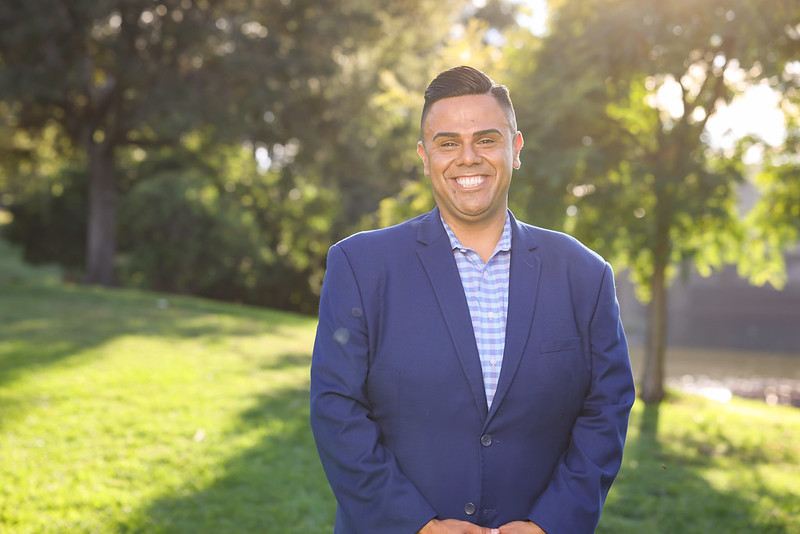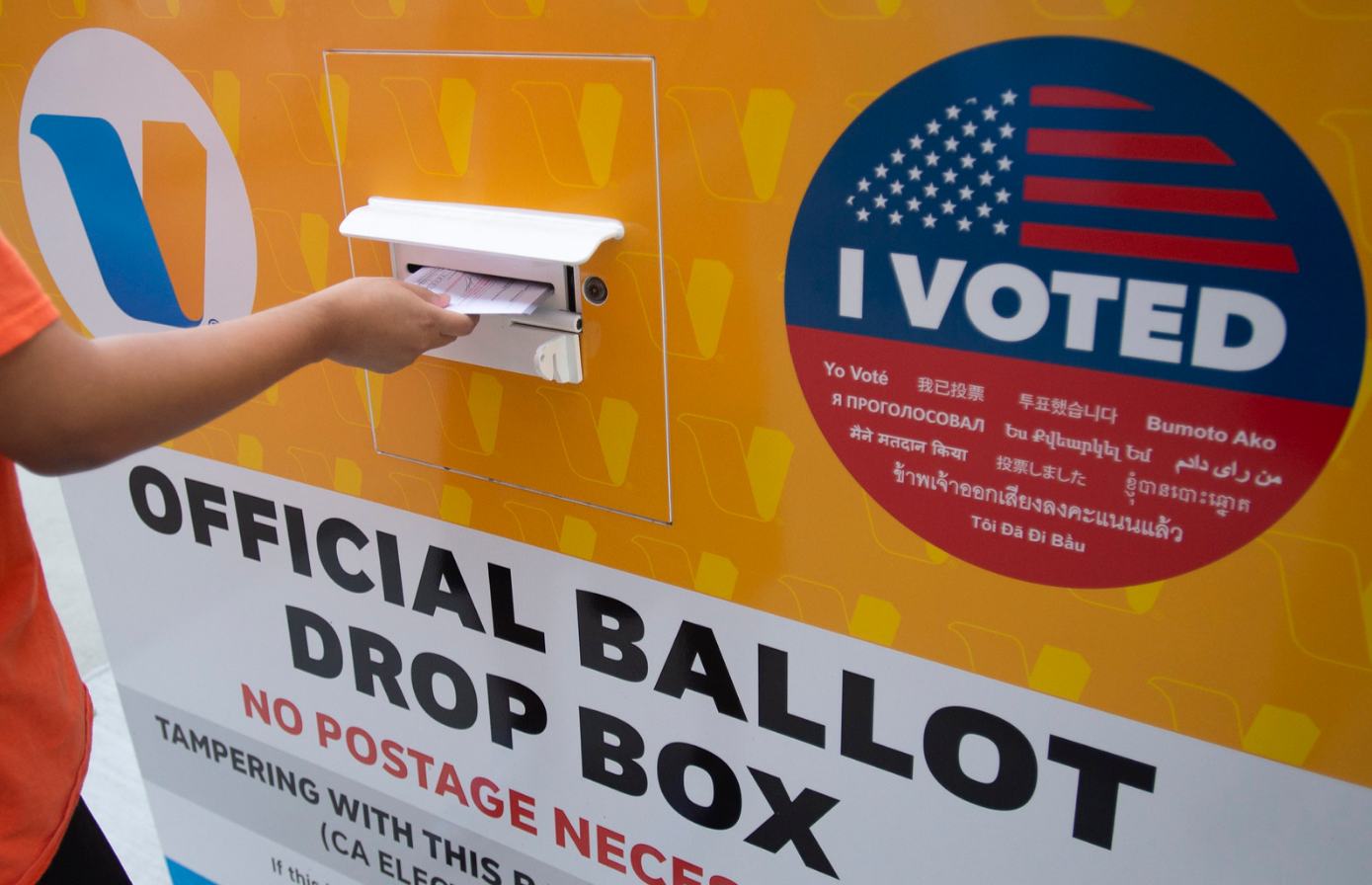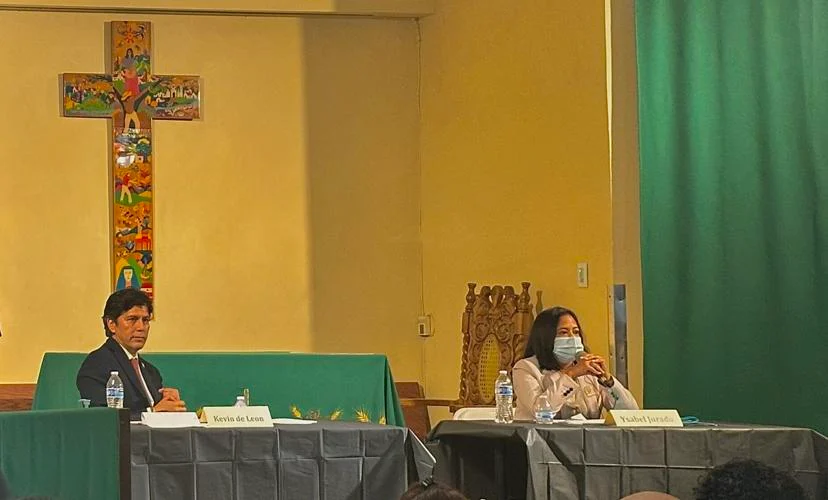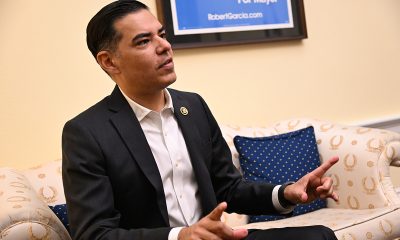California Politics
Gov. Newsom: Calif. will not do business with Walgreens
20 Republican state attorneys general threatened to sue Walgreens for offering mifepristone

SACRAMENTO – Gov. Gavin Newsom (D-Calif.) announced on Monday that California will not do business with Walgreens following the company’s announcement of its decision on Friday to not distribute the abortion pill mifepristone in 20 states.
The move comes amid pressure from conservative lawmakers and threats of legal action against Walgreens and CVS from 20 Republican state attorneys general, who claimed in a Feb. 1 press release that selling mifepristone is “unsafe and illegal.”
Mifepristone is still legal in several of the states where Walgreens has decided to stop providing it in response to the scepter of lawsuits from state attorneys general: Alaska, Iowa, Kansas and Montana.
Newsom’s office told NPR that California will review “all relationships between Walgreens and the state,” but declined to provide more specifics.
“California won’t be doing business with @walgreens – or any company that cowers to the extremists and puts women’s lives at risk,” Newsom wrote in the tweet. “We’re done.”
California won’t be doing business with @walgreens — or any company that cowers to the extremists and puts women’s lives at risk.
— Gavin Newsom (@GavinNewsom) March 6, 2023
We’re done.https://t.co/OB10cYfm8H
“Elected officials targeting pharmacies and their ability to provide women with access to safe, effective, and FDA-approved medication is dangerous and just unacceptable,” White House Press Secretary Karine Jean-Pierre said during a briefing on March 3.
“The administration will continue to stand by the FDA’s expert judgment in approving and regulating medications. And in the face of barriers to access and concerns about safety of patients, healthcare providers, and pharmacists, we will continue to support access to this critical medication within the limits of the law,” Jean-Pierre said.
Meanwhile, Judge Matthew Kacsmaryk of the U.S. District Court for the Northern District of Texas is expected to soon rule on a case challenging the safety of mifepristone that advocates for reproductive justice fear could lead to a nationwide injunction prohibiting the sale and distribution of the abortion drug.
Medical experts have slammed the Texas plaintiffs’ lawsuit, arguing that Mifepristone’s safety and efficacy have been well demonstrated for years. Kacsmaryk, who was appointed by former President Donald Trump, is nevertheless expected to rule in their favor.
“The plaintiffs who have no legitimate standing have hand-picked him to hear this case that has no merit because they know what they’re getting with Judge Kacsmaryk,” Sen. Ron Wyden (D-Ore.) said last month.
Jean-Pierre addressed the case during a press briefing on March 1: “The decision would be unprecedented, as you know, and devastating to women’s health. And we may find ourselves in uncharted territory,” she said.
“And so, we’re closely — closely working with the Justice Department and DHS — HHS on this, on how to be prepared for any range of outcome or potential outcomes,” Jean-Pierre added.
Breaking News
Controversy brews in the City of Glendale over support of Pride event
Republican Mayor Ara Najarian pushes back on funding family-friendly Pride event

Over the last three weeks, glendaleOUT — a local LGBTQ group based in Glendale, California and city leadership have been at odds over securing financial support of a family-friendly Pride event set to happen on Saturday, June 7. As of Tuesday, Glendale’s city council voted 3-2 in favor of funding the event, ending a weeks-long argument over securing the funds.
The controversy began when the group highlighted how neighboring cities have visibly demonstrated support for Pride Month celebrations across the county, while the City of Glendale has yet to sponsor events with banners, city logos and financial sponsorship.
Councilmember Dan Brotman proposed $5,000 in sponsorship funds, noting that the city has funded other cultural events with much larger amounts.
Local leaders, but specifically Mayor Ara Najarian — who was just re-elected for a fifth term — are pushing back and opposing the proposal for funding. According to sources, Mayor Najarian openly opposed the proposal, stating a distant conflict of interest as the reason for the opposition.
LGBTQ advocates have been quoted as saying this is a “bad-faith political tactic, not grounded in any real conflict of interest.”
The next potential vote is expected to happen today at a city council meeting. Organizers say that the Pride event will happen regardless, but that they still hope to shed light on the patterns of sexual orientation-based discrimination in the city council.
For more information about the free community Pride event, visit glendaleOUT’s website.
California Politics
Zbur continues fight for LGBTQ rights amid Trump attacks
He continues to cement a pro-equality legacy in state legislature

Assemblymember Rick Chavez Zbur (D-51), 68, grew up in a rural farming community
surrounded by animals and land in Rio Grande Valley, New Mexico — ultimately becoming the first person in his rural community to attend an Ivy League university.
Since then, he has continued to build his reputation as an advocate and as a
political leader in environmental justice and LGBTQ rights.
Most recently, Zbur introduced Assembly Bill 309, which would support
California’s strategy to prevent the spread of HIV and viral hepatitis by preserving existing laws that increase access to sterile syringes at no added cost to the state.
“Extensive research and data collection has repeatedly proven that increased access to sterile syringes significantly lowers rates of transmission and saves lives
without increasing rates of drug use,” said Zbur when presenting AB 309.
He added that the average estimated cost for lifetime medical costs related to HIV treatment for one person is $326,500. “Syringe access not only saves lives, but it also saves individuals and the state from the steep cost of treatment,” he continued.
As a gay man in the peak of the AIDS crisis, Zbur saw some of his own close friends become ill, motivating him to become an AIDS activist at a time when the federal government was failing to provide resources to the community that needed them the most.
“Since I’ve been in the Assembly, I’ve always had a number of bills every year that focus on uplifting the LGBTQ community, as well as getting to zero, in terms of HIV — zero transmissions, zero deaths, zero stigma.”
Prior to this bill and a few others, Zbur also introduced AB 5, which he says was a culmination of eight years worth of work, from the time he started working for Equality California (EQCA), the state’s largest nonprofit organization dedicated toward advocating for LGBTQ civil rights.
AB 5, which was passed and is now known as the Safe and Supportive Schools
Act, is meant to improve the conditions for LGBTQ students in schools.
“I think this bill has the most impact for LGBTQ youth and it’s the one I’m proudest of because it requires that every teacher in California schools has LGBTQ cultural competency training, to make sure that our schools are safe and supportive.” Zbur, a longtime advocate for the LGBTQ community, has a long history of activism.
In the early 1980s, Zbur campaigned for the fight against HIV/AIDS, helped found the Children Affected by AIDS Foundation and alongside the Los Angeles LGBT Center, organized fundraisers for Bill Clinton while he was governor of Arkansas, and Barbara Boxer, who was then running for U.S. Senate.
“I think part of me coming out more publicly was due to the HIV epidemic and
the fact that I had friends that were getting sick,” he said. “I had a long-term boyfriend
back then and we started to get politically active, really trying to make sure that the
government was doing something about the HIV epidemic.”
He says that this is when he decided he was going to get Barbara Boxer elected, because she was the only Senate candidate during that time who was even mentioning the LGBTQ community.
In 1996, Zbur ran for the United States House of Representatives in California’s 38th congressional district against Republican incumbent Steve Horn. He became the first openly gay non-incumbent congressional primary candidate to win an election when he won the Democratic primary election on March 26, 1996.
During many years following that win, Zbur jumped into another pool of justice
fighting for environmental issues and then in 2014, joined Equality California as
executive director. Under his leadership, EQCA quadrupled in size, passed groundbreaking legislation to advance LGBTQ equality measures and sued the Trump-Pence administration twice, blocking attacks against the transgender community of California.
In 2022, Zbur was elected to the California State Assembly to represent the 51st
Assembly District, a position he currently serves. He was appointed in July 2023 by
Assembly Speaker Robert Rivas to serve as the Democratic Caucus Chair of the California Assembly, one of the Speaker’s key leadership positions. During that time, he also led the advancement in civil rights and social justice for the many other marginalized communities within the LGBTQ umbrella, such as communities of color, communities of faith, immigrants women and people living with HIV.
Zbur says that his work is never over.
“We’re facing greater risks that are greater than I think we’ve faced in recent
years coming out of the [first] Trump administration. The targeting of transgender and
gender non-conforming people is an even greater part of his hostility toward our
community,” he said. “It’s very real, and we see that it’s not just rhetoric. He’s taking real
steps to try to shut down the healthcare that LGBTQ people and transgender people
need.”
Zbur says that he and the other members of the LGBTQ Caucus in Sacramento
are constantly thinking of those decisions and their repercussions.
“I have another bill that is focused on helping transgender people get the
government documents they need, so they can protect themselves from the Trump
administration and so that they can travel easily to get medical care.”
Zbur says that his own coming out story was positive, but he grew up in a time
where he did not know anyone who was out about their identity. He went through many
trials and tribulations to end up in a space where he was finally accepted.
“For me, coming to terms with the fact that I was LGBTQ, was something that
took a number of years,” said Zbur. “The world was just a very different place back then
and the risks were high, coming out.”
When he started his career as a lawyer, he became a partner in a law firm called
Latham and Walkins, where there was not a single person who was out.
“I eventually came out when I was a fourth or fifth year associate and I became
the first out lawyer in the firm’s history, though there were other gay lawyers at the firm.”
Now, at 68, Zbur says that his only regret is that he lived in the closet for too long.
“When I look back at the things I regret, it’s that I lived in the closet for as long as
I did,” he said. “That is a very limiting thing that I think doesn’t allow your soul or your
spirit to flourish.”
California Politics
Governor Newsom supports bill to put LGBTQ helpline number on student ID’s
AB 727 would put the number for The Trevor Project on the back of students ID cards

Gov. Gavin Newsom expressed support for LGBTQ suicide hotline measures for K-12 students in direct response to recent reports that Secretary of Health and Human Services Robert F. Kennedy Jr’s., plans to cut funding for the national nonprofit that provides the resource to LGBTQ people.
“Cutting off kids’ access to help is indefensible. While the Trump administration walks away from its responsibility, California will continue to expand access to life-saving resources, because the life of every child — straight, gay, trans — is worth fighting for,” said Gov. Newsom.
Assembly Bill 727, introduced by Assemblymember Mark González, would aim to facilitate pupil and student safety by requiring schools and institutions to have the telephone number and text line for a specified LGBTQ suicide hotline provided by The Trevor Project, that is available 24 hours per day, 7 days per week.
Existing law that will be enforced July 1, 2025, requires a public or private school that serves pupils in any of grades 7 to 12, inclusive, and that issues pupil identification cards to have printed on the identification cards the number for the 988 Suicide and Crisis Lifeline.
This bill would additionally require the list of K-12 public schools and institutions to provide support to youth and their families who have been subjected to school-based discrimination, harassment, intimidation or bullying on the basis of gender identity, sexual orientation or gender expression.
Conservative organizations like the California Family Council are pushing back on this bill, stating that this bill is “forcing LGBTQ advocacy on every student ID — no exemptions for religious schools,” and saying it “undermines families.”
A national 2024 survey by The Trevor Project on mental health of LGBTQ young people, reports that 1 in 10 young LGBTQ-indetifying people in the United States attempted suicide in 2023. Over a third of LGBTQ young people seriously considered suicide within the past year and that figure was even higher for trans and nonbinary-identifying youth, with that figure being 46%.
The survey also found that half of LGBTQ youth who wanted mental health resources and care could not get them. Over 50% of survey respondents answered “a lot” when asked about how often recent politics negatively impact their well-being.
The Trevor Project is one of the nonprofit organizations that is currently at high-risk for losing their funding under Trump’s budget cuts.
The phone number to call for help is 1-866-488-7386 and the number to text for help is 678-678, or you can send them a message at the site link.
California Politics
What does Measure G mean for Los Angeles County?
L.A. County makes historic strides toward achieving more government accountability and representation

Measure G campaign declares victory, making way for pivotal and significant reform in Los Angeles County and ushering in a new era of accountability. Voters in favor of the measure hope to see a transformation of the bureaucratic system and more valid representation from the additional board supervisor seats.
“With the passage of Measure G, we are advancing a vision of Los Angeles County that prioritizes transparency, accountability and equitable representation. This measure gives a voice to communities that have often been overlooked, creating a governance structure that truly reflects our diverse County,” said Nichelle Henderson, president of the Los Angeles Community College District.
This measure made history, declaring victory after gaining majority approval from voters. This measure makes history after various attempts to expand the LA County Board of Supervisors failed in 1962, 1976, 1992 and again in 2000.
The measure will now require County departments and agencies to present their budgets to the Board in open, public meetings, prior to adoption of annual budgets, effective immediately.
The “revolving door,” policy prohibiting former County officials from lobbying the County for a minimum of two years after leaving office, will now be strengthened, effective immediately.
Elected officials who are criminally convicted of a crime will be suspended without pay, also effective immediately.
The measure will establish and create an independent Ethics Commission, as well as an Office of Ethics Compliance, led by an Ethics Compliance Officer by 2026.
Under the measure, a County Executive will be elected in 2028 and the Board of Supervisors will nearly double in size by 2032, following the 2030 independent redistricting process.
The motion was originally co-authored by LA County Board Chair Lindsey Horvath and Supervisor Janice Hahn, with the support of Supervisor Hilda L. Solis. Horvath and Solis argued that five people could not effectively represent such a large and diverse population, while Supervisors Holly Mitchell and Kathryn Barger panned the move as rushed and ill-conceived.
LA County residents have affirmed that the way forward lies in a complete transformation of the County’s governance. Now that it’s been approved, the measure will add true checks and balances through a more representative legislative branch and executive branch with direct accountability to voters.
“We will now have the ability to fix what is broken and deliver the results our communities are counting on, especially in the face of threats to our most vulnerable residents from the next federal administration,” said Horvath.
“Through this historic change, we will address the most pressing issues facing Angelenos with greater urgency and accountability, and create a more ethical and representative government fit for the 21st century.”
The approval of this measure made history because previous attempts to change the county’s charter failed, while Measure G was approved through broad-based support from nurses, small businesses, civil rights groups and state–as well as–federal leaders from throughout the county.
The academic community responded to the approval of the measure, which is set to be enshrined into the L.A. County Charter shortly after it is certified by the L.A. County Registrar-Recorder on December 3, 2024.
“This historic victory gives voice to communities who have long been marginalized in the decision-making process,” said Sara Sadhwani, Ph.D., professor of politics at Pomona College. “With a more transparent and responsive governance structure, we’re creating a County government that truly reflects the diversity and needs of its people. This is a win for democracy and for all Angelenos.”
California Politics
Mark Gonzalez triumphs: A new era begins for Assembly District 54
Gonzalez will now represent neighborhoods in Montebello, Commerce, East L.A., Boyle Heights, Chinatown and Koreatown

LGBTQ+ Democratic candidate Mark Gonzalez wins Assembly District 54 seat against John Yi and succeeding Assemblymember Miguel Santiago (D-Los Angeles), who did not seek reelection for the position.
Both first-time candidates ran to represent one of the poorest districts in the state, with Gonzalez securing over 12,000 votes over Democrat John Yi, who ran against Gonzalez.
“Running to represent AD54 and earning the votes of those in our community, has been the honor of a lifetime,” said Gonzalez in an X post following the announcement of his win. “I remain committed to serving its people and our state as its next Assemblymember.
His opponent Yi, is the Executive Director of Los Angeles Walks, a pedestrian advocacy group and self-titled Local Nonprofit Leader. Yi is also a Democrat who championed a single-payer healthcare system that would insure all residents of California and previously advocated for the expansion of Medi-Cal benefits for all Californians, regardless of immigration status.
Gonzalez raised nearly ten times more than his opponent, who has had a history in nonprofit leadership and multiracial coalitions to promote health and justice-centered policies.
While running for Assembly, Gonzalez championed raising wages for working families, tackling LA’s homelessness and affordability crisis, and a guarantee for healthcare to all.
Gonzalez is an Assembly staffer who has served the area for over a decade, former Chair of the Los Angeles Democratic Party and Equality California Institute Board member. He worked for former Assembly Speaker John Pérez and served most recently as District Director for the current Assembly member, Miguel Santiago.
“This win is a testament to his dedication to the community and his vision for a more inclusive and equitable Los Angeles,” said Equality California’s executive director, Tony Houang. “We look forward to seeing the positive change he will bring to the Assembly and our state. On behalf of Equality California, we are excited to partner with him to continue the fight for equality and justice for all.”
As a former Chair of the L.A. County Democratic Party, Gonzalez championed change to make community college free, protect air and water quality, make housing affordable and safeguard abortion rights.
He grew up as the son of a single mother who relied on Section 8 to provide housing for them. He is a renter, organizer and activist who knows that the system as it is now, is not working towards the progress, safety or well-being of the marginalized and low-income communities of this district.
“I look forward to working with my colleagues in Sacramento to advance bold, common-sense policies that will make a meaningful impact on individuals and families across the state.”
Gonzalez will now represent District 54, will be responsible for neighborhoods in Montebello, Commerce, East L.A., Boyle Heights, Chinatown and Koreatown.
California Politics
2024 Election: A short guide to California propositions
Prop 3 would ensure marriage equality in state constitution

The 2024 Election is upon us and this means that it is time to vote — if you haven’t already.
For some, voting might be confusing or daunting. For others, it might be your first time voting, whether you are now old enough to vote, recently became a citizen or were previously incarcerated and can now vote in California.
The election produces a lot of anxiety for Americans because there are a lot of issues to be determined. A poll by the American Psychological Association suggests that the future of the nation, economy, and presidential election, top U.S. stressors.
The poll also suggests that the biggest concerns are the end of Democracy and political violence.
A Stress in America 2024 report by the APA, points out that 77 percent rate the future of our nation as a significant source of stress, 69 percent cite the presidential election and 73 percent cite the economy, as a significant source of stress.
For people in the LGBTQ+, QTBIPOC, low-income, and otherwise marginalized communities in California, there are a few key issues that are at stake.
We have summarized the propositions on the California ballot.
California propositions
Proposition 2 would authorize $10 billion in bonds for upgrade, repair and construction on K-12 educational facilities, community colleges, charter school and career technical education programs. The bonds would cost California $500 million annually and have to be repaid with interest over the next 35 years.
Proposition 3 is the Constitutional Right to Marriage ballot initiative that if approved, would guarantee that same-sex and interracial marriages will continue to be valid and recognized by the California Constitution, which currently only recognizes heterosexual marriages.
This proposition would guarantee that if same-sex and interracial marriage were to be challenged on the federal level by the Supreme Court, there would be protections on the state level.
Proposition 4 would authorize bonds for safe drinking water, wildfire prevention and protecting communities from natural disasters and other climate risks. A yes vote would approve the state of California to borrow $10 billion to fund activities aimed at conserving natural resources. The bonds would have to be repaid over the next 40 years, at $400 million annually.
Proposition 5 would allow certain local bonds and related property taxes to be approved with a 55 percent vote of the local electorate, rather than the current two-thirds majority vote requirement. The bonds would have to fund local affordable housing, supportive housing and public infrastructure.
Proposition 6 would amend the California Constitution to remove current provisions that allows jails and prisons to impose involuntary servitude to punish crime. State prisons would not be allowed to punish anyone who refuses to work.
Proposition 32 would raise the minimum wage to $17 per hour for employers with more than 26 employees effective immediately and then to $18 as of Jan 1, 2025, and for employers with 25 or fewer employees, to $17 effective on Jan 1, 2025, and $18 as of Jan 1, 2026.
Proposition 33 would repeal the Costa-Hawkins Rental Housing Act of 1995, which currently places limits on local governments from enacting rent control laws. A yes vote would mean that the state would not limit the kinds of rent control laws cities and counties could or could not have. A no vote would mean the state would continue to limit the kinds of rent control laws cities and counties could have.
Proposition 34 would restrict spending of prescription drug revenued by certain health care providers by requiring providers to spend 98 percent of revenues from federal discount prescription drug programs on direct patient care. Increased state costs would likely total millions annually to enforce the new rules on health care entities.
Proposition 35 would provide funding for Medi-Cal health care services by making an existing tax on managed health care insurance plans permanent. New rules would direct how the state must use revenue.
Proposition 36 would allow felony charges for possessing certain drug types and for thefts under $950, if the defendant has two prior drug or theft convictions. This means that if approved, punishment for drug and theft crimes would increase such as longer prison sentences.
California Politics
Ysabel Jurado: A political maverick changing the narrative in LA politics
Jurado says it’s time for something different and she is it.

Tenant rights attorney Ysabel Jurado is known as the progressive, grassroots candidate in
the race for the hot seat that her opponent Kevin De León currently holds in Council District 14, even after years of recalls following a racism and homophobia scandal.
Jurado says it’s time for something different and she is it.
“I’m an API woman, I’m educated, I’m a citizen and English is my first language–
among others,” said Jurado in an interview with Los Angeles Blade. “And I’m also proud that on this team, we are largely led by LGBTQ+ folks, women of color, and people of color.”
As an out candidate, Jurado says she is intentional about the people she hires as part of
her campaign team. She is inclusive of nonbinary people and anyone who identifies as part of the QTBIPOC and LGBTQ+ acronyms, because she doesn’t just want to talk about them, she also wants to incorporate their lived experiences in her campaign mission. She says this in part
because of her own identity, but also because of the scandal that rocked De León’s political career.
The scandal follows various City Council members of CD-14 ranting about other BIPOC
members of Council and their LGBTQ+ families. The leaked audio recording included her
opponent De León — who at the time had his eyes set on running for mayor of Los Angeles.
“A lot of the groups talked about in these tapes are the people that we’ve recruited and
who we are making sure to build a coalition with,” said Jurado.
Going into this campaign race, she asked herself: ‘How do I go into this institution and
not become the worst parts of it?’
“If I ever become that, I want you to put my feet to the fire and shift me out of there,
because at that point I have betrayed myself,” responding to the question she had asked herself.
Jurado is currently facing backlash from many community members who support the
police force in Los Angeles, after she was elicited to respond to a question regarding her stance
on police funding. Some of those community members are now actively pushing for her to drop out of the race for Council District 14.
According to NBC4, family members of fallen Los Angeles Police Department officers
have spoken out to say they worry the remarks she made in regards to her stance on police
funding would hurt the LAPD’s ability to recruit new officers.
“In a meeting with students at Cal State LA, I quoted a lyric from a song that’s been part
of a larger conversation on systemic injustice and police accountability for decades…,” said
Jurado to NBC4.
Later, other news outlets reported that the person who elicited the ‘f-ck the police,’
response from Jurado, was a staffer working for De León.
“When you look at what I say and when you look at what I’m doing, I walk the walk and
I’m not going to take any bullshit sitting down, even though [De León] tries,” said Jurado in an
interview.
Jurado has been campaigning for this position since last summer and has since made
dozens of headlines that suggest she is a political force to be reckoned with and has been
building gains in the mostly Latin American Council district. She also brings up the long and problematic history of candidates and elected officials who have resigned, been indicted for corruption, or who have been asked to ‘step down over shady backroom deals.’
“The focus isn’t about me and him and what petty back-and-forth things we say, it’s
about our communities and wanting to make sure we talk to voters and rising above. Because at the end of the day, it’s about the work,” said Jurado. “It’s not about the noise and trying to bring it back to who gets hurt by all these conversations, which are the constituents.”
Jurado is an out LGBTQ single mother and lifelong resident of Highland Park who has
tirelessly fought for tenant rights and protections during her time as a tenants’ rights attorney and housing justice advocate. She prides herself in being a self-made politician who started her journey at Pasadena City College, then earned her bachelor’s degree at University of California, Los Angeles and then went to law school.
Jurado then went on to fight gentrification-driven displacement and in her candidate
statement, she says she spends her days protecting neighborhoods from corrupt developers and politicians.
“This campaign is for ‘the other.’ Being a daughter of immigrants, or whatever your
identity is, you become fluent in two different modalities,” said Jurado. “You know what the
dominant culture is and what the non-dominant culture is and you learn how to navigate through it. I think that is a superpower our people have, people who have always been ‘othered.’
Jurado is currently canvassing in the community, leading up to the election with support from Hugo Soto-Martinez, LA City Council Member of CD-13 and Eunisses Hernandez, LA City Council Member CD-1.
California Politics
What you missed at the CD-14 debate between Ysabel Jurado and Kevin De León
LGBTQ+ candidate faces off against opponent Kevin De Leon on community forum on Wednesday

Los Angeles Council District 14 (CD-14) candidates Ysabel Jurado and Kevin de León sparred over their qualifications in what could have been their last in-person debate before the November election.
Wednesday’s CD-14 debate, a district home to approximately 265,000 people, 70% of them Latin American, offered the public a chance to hear from both candidates and their stand on issues such as homelessness, public safety and affordable housing, among other things.
CALÓ News was one of the media outlets that were present inside Dolores Mission Catholic Church in Boyle Heights, where the debate was held. Below are our reporter’s main takeaways.
People showed up and showed out. More than 300 people attended the debate, which was organized by Boyle Heights Beat and Proyecto Pastoral. More than 260 people gathered inside the church and the rest watched via a livestream projected on the church’s patio.
The debate was bilingual, with translation services available for all, honoring the many Spanish speakers that live in the district, as Brendan P. Busse, pastor of the church, said in the opening statement.
As part of the event guidelines, Busse also shared that no applause or booing was to be permitted, a rule that was broken within the first ten minutes of the forum. “Where you are tonight is a sacred place. People who are in need of shelter sleep here and have for the last 40 years,” he said when referring to the church transforming into a homeless shelter at night for over 30 adults. “Power and peace can live in the same place.”
That was the most peaceful and serene moment throughout the two-hour forum.
What followed was traded insults and competing visions from both candidates.
One of the first stabs occurred when De León accused Jurado of wanting to “abolish the police” and when Jurado reminded the public of De Leon’s “racist rhetoric,” referring to the 2022 scandal over the secretly recorded conversation with Gil Cedillo and Nury Martínez where they talked about indigenous Mexicans, Oaxacans, the Black and LGBTQ+ communities and councilman Mike Bonin’s adopted son.
“I made a mistake, and I took responsibility. I have been apologizing for two years,” De León said. “Just as in the traditions of the Jesuits, love, reconciliation [and] peace, one must choose if we are going to be clinging to the past or move forward. I choose to move forward.”
When Jurado was asked about her stance on police, she said she had never said she wanted to abolish the police. “Don’t put words in my mouth,” she told De León. “I have never said that,” she said. “We put so much money into public safety into the LAPD yet street business owners and residents in these communities do not feel safer. The safest cities invest in communities, in recreation and parks, in libraries [and] youth development.”
De León and Jurado also discussed their plan to work with the homeless population, specifically during the 2028 Olympic and Paralympic Games in Los Angeles. In Los Angeles County, an estimated 75,312 people were experiencing homelessness, as stated in the 2024 homeless count. For CD-14 the issue of homelessness takes a higher level as it is home to Skid Row, which has one of the largest homeless populations in the U.S.
“We should continue to house our unhoused,” De León said.
He followed this by saying that under his leadership, CD-14 has built the most interim housing than “in any other place in the entire city of L.A.” He made a reference to the Boyle Heights Tiny Home Village and 1904 Bailey, both housing projects in CD-14.
“We need safety when the Olympics come,” he added.
Jurado said De León’s leadership has fallen short in his years in office, specifically when it comes to the homeless population and said that housing like the tiny homes is not sufficient for people in the district to live comfortably.
“My opponent has governed this district, Skid Row, for over 20 years. Has homelessness in this district gotten better? We can all agree that it hasn’t,” she said. “County Supervisor Hilda Solís put up 200 units that are not just sheds; they have bathrooms, they have places and they have support services. Why hasn’t [CD-14] gotten something better than these tiny homes?”
One of De León’s repeating arguments in various of his answers was the fact that Jurado has never held public office before. “I’ve dedicated my whole life to public service, to the benefit of our people. My opponent, to this day, has not done one single thing,” De León said in the first few minutes of the debate.
In one of the questions about low-income elders in the district, he listed some of his achievements when helping this population, including bringing free vaccines for pets of seniors of this district and food distributions, which, as De León noted, help people with basic food needs, including beans, rice and chicken. “The same chicken sold in Whole Foods,” he said.
Jurado defended herself against the reality of never holding public office and said her work as a housing rights attorney and affordable housing activist have given her the tools and experience to lead the district in a different direction than the incumbent, De León. “We can’t keep doing the same thing and expect different results,” Jurado said. ‘We need long-term solutions,” she said.
Last month, The L.A. Times also reported on Jurado’s past political experience, including working on John Choi’s unsuccessful 2013 run for City Council, as well as her work as a scheduler in Mayor Eric Garcetti’s office and how she was appointed by Garcetti to the Human Relations Commission in 2021.
She later added that she was proud to already have the support of some of the L.A. City Council members, such as Eunisses Hernández, Nithya Raman and Hugo Soto-Martínez, which De León later referred to as the “socialist council members.”
After the debate, CALÓ News talked to both candidates and asked how they thought the debate went.
“It was a spirited debate, no question about it,” De León said. “Sometimes elections can take a real ugly twist that is very similar to Trump-ian characteristics. Like Donald Trump just says whatever he wants to say, no matter how outlandish [or] inaccurate it is.”
When asked the same question, Jurado said, “ I think my opponent said a bunch of lies and said that he has plans for this district when he’s had four years to execute all of them. It’s really disappointing that only now he suddenly has all these ideas and plans for this district.”
Both candidates told CALÓ News they will continue working until election day and making sure CD-14 residents show up to vote.
“But I think past the debate[s], it’s just [about] keeping your nose to [the] grindstone, working hard, and taking nothing for granted, knocking on those doors and talking directly to voters,” De León said.
Jurado said she still has a couple other events that she and her team are hosting before election day. “I’m out here talking to voters. We want to make sure that people know who I am and that they have other options. People are disappointed. We’re going to keep folks engaged and make sure that [they] turn out to the polls,” she said.
Jorge Ramírez, 63, from Lincoln Heights, said he has been supporting De León since his time in the State Senate and said he will continue to vote for him because he doesn’t know much about his opponent. “He is the type of person we need. He’s done a lot for immigrants,” he said. “The other person, we don’t know much about her and she’s not very well known. She doesn’t have much experience in this field.”
Alejandra Sánchez, whose daughter goes to school in Boyle Heights and lives in El Sereno, said she believes CD-14 has been in desperate need of new leadership and worries that many people will vote for De Leon just because he is who they have known for so long. “It’s very powerful to see a woman leader step in… It’s been an incredible year to see a woman president elected in Mexico, a woman running for president in the U.S. and a woman also running for leadership here in our community,’ she said. “That’s part of the problem… we are afraid to think about something new, about the new leadership of someone doing things differently.”
General election day will take place on Tuesday, November 5, 2024. Early voting began on October 7. You can register to vote or check your registration status online on the California Online Voter Registration page.
California Politics
California Senate race: Trans Democrat Lisa Middleton aims for historic win in Inland Empire
Candidate hopes to represent 19th Senate District

Democrat Lisa Middleton is the first openly transgender person elected to a non-judicial office in California and is currently running to represent the 19th Senate District in a tight Inland Empire race.
She is one of more than 21 out LGBTQ candidates running for a U.S. congressional, state Senate or state Legislative seat in 2024.
As a longtime leader of the LGBTQ community, Middleton works to protect and advance civil rights. She serves on the Equality California Institute’s board of directors and would become the first openly trans person to serve in the California State Legislature.
Middleton began her transition 30 years ago, but her reputation in politics, fraud investigation and governance started long before. Middleton, 72, is the former mayor of Palm Springs after serving as mayor pro tempore from 2020 to 2021 and then becoming the first openly trans mayor in California, succeeding Christy Holstege in December 2021.
Middleton is the child of blue-collar union workers.
In addition to supporting LGBTQ rights, she also supports projects such as renewable energy using wind and solar, stating that these are win-win solutions that help labor workers and combat climate change.
Middleton is running against GOP Latina Rosilicie Bogh, 52, a former elementary school teacher, school board member, and realtor.
Bogh has publicly opposed bills that boost gender-affirming health care services and protect trans children and their families from being criminalized for seeking treatment in California.
Bogh has also abstained from voting on gay marriage rights in the state constitution and recognizing Pride Month.
She gained attention earlier this year when she stood up to oppose a law that protects educators and school staff from forcibly outing trans children to their families.
Assembly Bill 1955 went into effect earlier this summer after getting support from Gov. Gavin Newsom and backlash from Elon Musk, leading him to withdraw X and SpaceX from California.
The race for this seat is stimulated by newly redrawn district boundaries that now include thousands more registered Democrats.
The new 19th Senate District now spans from Coachella Valley to the San Bernardino Mountains and from the San Jacinto Valley to the High Desert, including highly visited places like Big Bear City, Joshua Tree, and Palm Springs.
The redrawn district includes San Bernardino County, which has Republican strongholds, but also includes the more liberal areas of Riverside County and Palm Springs, totaling around half a million voters.
A Report of Registration released earlier this summer shows that the district is now nearly even in terms of Republican and Democratic support, with 35 percent and 36 percent respectively.
In the March primary election, Bogh won 54 percent of the vote, while Middleton secured 46 percent.
In the 2020 presidential election, Donald Trump won the district by a narrow margin.
Both candidates are trailblazers, so who will win over the majority vote in the upcoming election that is only 57 days away?
Both candidates say they’re avoiding culture war clashes to focus on bread-and-butter issues.
For Middleton, the bread-and-butter issues are protecting reproductive care, fixing roads, creating jobs, increasing neighborhood safety, demanding accountability for taxpayers, and building housing to address homelessness.
Middleton markets herself as a neighborhood advocate who provides “common-sense solutions” to the region’s challenges.
Her track record includes working as an auditor for California’s State Compensation Insurance Fund, working her way up to becoming senior vice president of internal affairs and serving as chair of California’s Fraud Assessment Commission.
Her goal in the Legislature is to eliminate wasteful spending of tax dollars.
As mayor of Palm Springs, Middleton led the city’s economic recovery from the COVID-19 pandemic by helping small businesses reopen and creating well-paying jobs.
Prior to that, Middleton was appointed to the Board of Administrators of the California Public Employees Retirement System (CalPERS), which aims to build health and retirement security for California’s state and local school employees. Currently, she serves as chair of the Finance and Administration Committee and vice chair of the Risk and Audit Committee.
Middleton married her wife Cheryl, a now-retired nurse, in 2013, shortly after moving to Palm Springs. Together they have two children who are educators.
Middleton was also included in the 2016 Pride Honors Award at Palm Springs Pride, receiving the Spirit of Stonewall Community Service Award.
Organizations like Planned Parenthood, Reproductive Freedom For All California, National Union of Healthcare Workers, California Women’s List, and others support Middleton.
A list of openly LGBTQ candidates on the California ballot can be found below:
U.S. House of Representatives:
- Congressional District 16: Evan Low
- Congressional District 23: Derek Marshall
- Congressional District 39: Mark Takano
- Congressional District 41: Will Rollins
- Congressional District 42: Robert Garcia
California Senate:
- Senate District 3: Christopher Cabaldon
- Senate District 11: Scott Wiener
- Senate District 17: John Laird
- Senate District 19: Lisa Middleton
- Senate District 25: Sasha Renee Perez
- Senate District 31: Sabrina Cervantes
California Assembly:
- Assembly District 24: Alex Lee
- Assembly District 47: Christy Holstege
- Assembly District 51: Rick Chavez Zbur
- Assembly District 54: Mark Gonzalez
- Assembly District 57: Sade Elhawary
- Assembly District 58: Clarissa Cervantes
- Assembly District 60: Corey Jackson
- Assembly District 62: José Solache
- Assembly District 72: Dom Jones
- Assembly District 78: Chris Ward
California Politics
Newsom signs law banning schools’ gender notification policies
Assemblymember Chris Ward (D-San Diego) introduced AB 1955

Governor Gavin Newsom signed Assembly Bill 1955 on Monday, banning forced outings in California schools after facing fierce opposition.
The signature comes after Newsom faced pressure to sign, leaving many to question his stance on LGBTQ issues after vetoing a bill that would have considered parents’ acceptance of a child’s identity or orientation in legal custody battles.
The bill, proposed by Assemblymember Chris Ward (D-San Diego) earlier this year, bans schools from creating or enacting policies that would out students to their parents about their gender, pronouns, name change, or sexual orientation.
“This comes from a growing national attack on LGBTQ+ people and in particular transgender individuals, with several California school districts and other states enacting policies that explicitly compel teachers to tell parents that their child identifies as transgender,” said Ward during a hearing last month.
“Forced outing policies harm everyone: Parents, families, and school staff by unnecessarily compelling the staff to involve themselves in family matters and removing the opportunity for families to build trust and have conversations on their own terms.”
The introduction of the bill follows a string of policies requiring counselors, administrators, teachers, school staff, and anyone else at the school to notify parents about their child’s transition or change of pronouns.
AB 1955 supports the Support Academic Futures and Educators for Today’s Youth Act (SAFETY Act) in preventing schools from enforcing or enacting forced outing policies.
“As a nonbinary educator working at a middle school, I definitely feel relieved to have some solid protection at the state level, and I feel empowered to continue advocating for my LGBTQ+ students,” said Amanda Estrada, a middle school teacher at Los Nietos Unified School District.
Lawmakers were discordant last month at a hearing that erupted in emotions over the issue. Following the hearing, legislators sent the bill to Newsom to stop these policies against LGBTQ students, families, and educators who felt passionately about the issue.
Last summer, Chino Valley Unified School District began enforcing the policy notifying parents of any requests “to change any information contained in a student’s official or unofficial records.” The policy was later blocked in court, sparking a civil rights lawsuit from California, bringing in Attorney General Rob Bonta to advocate against the policy.
Earlier this year, the school district revamped the policy, leaving out terms like gender, biological sex, and bathrooms but continues to push for outing students based on any changes they may request.
Existing law regarding the polarizing issue requires the State Department of Education to develop school-based resources and update previous resources that aim to support LGBTQ students. The new law now requires the State Department of Education to develop community-based resources for LGBTQ students and their families as well.
Existing law also prohibits discrimination against students participating in any program or activity conducted that receives or benefits from state-level funding. The new law will now include “any governing body or body of those educational entities from enacting or enforcing policy, rule, or administrative regulation that requires an employee or a contractor to disclose any information related to a pupil’s consent unless otherwise required by law.”
The law also states that students should feel “safe, supported, and affirmed for who they are at school.” This requires allowing them to choose when and how they want to make their new identities or orientation public and making resources available for them and their families.
This legislative push for laws and policies that protect LGBTQ youth will continue to face opposition as transition and gender identity continues to be a heavily polarizing and political issue among families.
The proposed bill cites research by the Trevor Project, stating that affirming school environments significantly lower the odds of transgender and LGBTQ youth attempting suicide.
Further findings also suggest that educators often face harassment and retaliation attempts because of their lawful efforts to uphold student privacy and protect them from discrimination.
“Over the past couple of years, I started to worry more about the creep of homophobic and transphobic rhetoric across the state, mostly through small districts like mine,” said Estrada. “Now that we have this law in place, I’ve got some peace of mind, and hopefully going forward, my students will too.”
-

 Theater4 days ago
Theater4 days agoGeffen Playhouse’s The Reservoir finds queer humor and joy in recovery and loss
-

 COMMENTARY2 days ago
COMMENTARY2 days agoUSAID’s demise: America’s global betrayal of trust
-

 a&e features3 days ago
a&e features3 days agoHow this Texas drag king reclaimed their identity through Chicano-inspired drag
-

 Obituary2 days ago
Obituary2 days agoThe queer community mourns the loss of trailblazer Jewel Thais-Williams
-

 a&e features4 days ago
a&e features4 days agoFrom Drag Race to Dvořák: Thorgy Thor takes the Hollywood Bowl for Classical Pride
-

 Television1 day ago
Television1 day agoICYMI: ‘Overcompensating’ a surprisingly sweet queer treat
-

 Arts & Entertainment3 days ago
Arts & Entertainment3 days agoMary Lambert Returns With a Battle Cry in new single, “The Tempest”
-

 Opinions11 hours ago
Opinions11 hours agoThe psychology of a queer Trump supporter: Navigating identity, ideology, and internal conflict
-

 Living9 hours ago
Living9 hours agoFaithfully queer: Finding God and growth in Modern Orthodoxy




